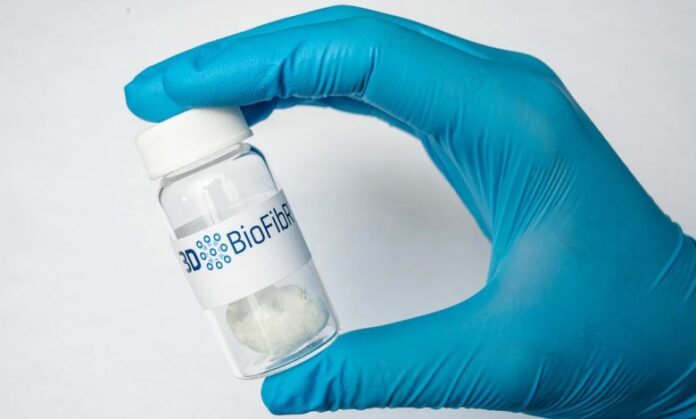3D BioFibR, a company that specializes in biomaterials for tissue engineering, is the latest to penetrate the 3D bioprinting market. With over $3.52M raised in seed financing, the company will expand its facilities to include a climate controlled biomanufacturing cleanroom and bring its premium collagen fiber products to market.
Collagen products can serve 3D cell culture and tissue engineering applications, especially the cellular scaffolds segment. 3D BioFibR’s fully automated and proprietary dry spinning process in particular could produce “high quality, diameter-controlled collagen fibers at commercial scale.”
The announcement follows the release of μCollaFibR™ , the company’s bioink additive for use in 3D bioprinting of tissue and organ models in a laboratory setting. μCollaFibR mimics the body’s natural cellular scaffold and acts like a biological rebar in bioinks used to print living tissues. When added to bioinks, μCollaFibR improves the mechanical durability of printed tissues so multiple cell types can be assembled layer-by-layer to produce highly functional tissue and organ models.
The CollaFibR™ scaffold for 3D cell culture allows researchers to study cellular reactions in a more physiologically relevant 3D environment, compared to traditional 2D cultures. The advantage of the CollaFibR scaffold is that it uses GMP type 1 collagen to produce a consistent collagen fiber matrix that resembles the biomechanical and biochemical properties of natural cellular environments.
Kevin Sullivan, CEO of 3D BioFibR, said: “our CollaFibR scaffold allows cells to grow and interact with the surrounding cellular scaffold in 3D, making it ideal for creating realistic tissue constructs for laboratory testing of new drugs and tissue models. Plus, our standard well plate dimensions are compatible with automated equipment for high throughput compound screening and advanced microscopy.”
With the tissue engineering market that is valued at $26B and is growing at 35% compound annual growth, the firm has received support from the Government of Canada, through the Atlantic Canada Opportunities Agency (ACOA), as well as advisory services and research and development funding of up to $391,949 from the National Research Council of Canada Industrial Research Assistance Program (NRC IRAP) supporting the development of its automated collagen fiber manufacturing system.
This financing round was led by Invest Nova Scotia with matching investment from Build Ventures and with investment from returning investors Concrete Ventures and Globalive Capital.
Remember, you can post job opportunities in the AM Industry on 3D ADEPT Media free of charge or look for a job via our job board. Make sure to follow us on our social networks and subscribe to our weekly newsletter : Facebook, Twitter, LinkedIn & Instagram ! If you want to be featured in the next issue of our digital magazine or if you hear a story that needs to be heard, make sure you send it to contact@3dadept.com






